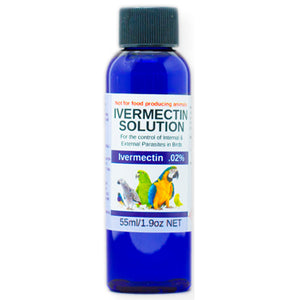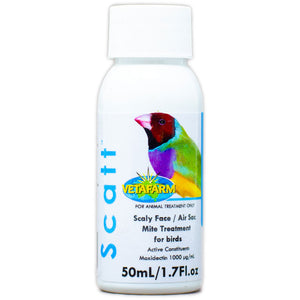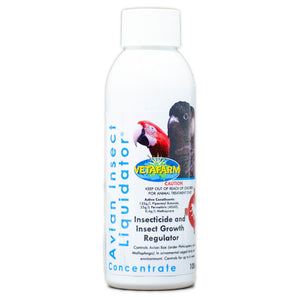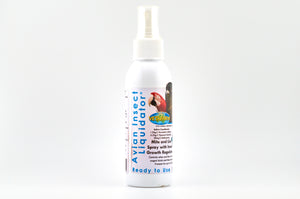Psittacosis: Questions and Answers
PSITTACOSIS : QUESTIONS & ANSWERS
Psittacosis, the "terror" of bird keepers, has long been a menace to numerous species of birds kept by cage and aviary bird keepers. Not only does it pose a threat to birds in captivity, it can also be transmitted to their owners, for whom the consequences are not to be taken lightly.
A number of factors have in the past contributed to building up what seems to be an aura of mystery and invulnerability around Psittacosis; the ability of the disease to recur at different times in both birds and humans, the difficulty often associated with diagnosing the disease, and the ability of Psittacosis to co-exist with other diseases. This has given the impression that the disease is unbeatable, Veterinarians at the Vetafarm Research Facility in Wagga Wagga, Australia, however, have shown that Psittacosis can be defeated when good bird management practices are combined with the use of their product "Psittavet".
The following interview was taken with Vetafarm veterinarian Dr Tony Gestier;
Q What is Psittacosis and why is it a menace to cage and aviary bird keepers?
A Psittacosis is a disease caused by the bacteria Chlamydia psittaci which lives and reproduces inside the living cells of birds and humans. Not only does the bacteria cause death in birds, it also lowers the resistance of their immune systems to secondary infection. This, in effect, allows Psittacosis to co-exist with other diseases. Psittacosis is one of the most common infections in cage and aviary birds. It can wreak havoc in aviaries, causing reduced fertility, and fecundity, deaths in the nest and sporadic deaths among breeding stock. The disease can also be transmitted to humans who may suffer fever, uncontrollable shaking, blinding headaches, a swollen spleen, muscle aches, pains, and sometimes a cough. Unfortunately the body cannot build up natural immunity to it, and unless correctly treated, the disease can return when the body's natural defences are low.
Q How is the disease transmitted?
A The Chlamydia bacterium is transmitted in a number of ways. It can be transmitted from one host to the next through direct contact between hosts, by breathing in feather dust and dust from faecal build-up, and through direct contact with other bodily secretions from infected birds.
Q What are the symptoms of Psittacosis in birds?
A Because the Chlamydia bacterium can exist in healthy birds for long periods of time without causing disease, bird keepers may not notice any problem with their birds until the birds are put under some kind of stress, such as when young birds are taken away from their parents. Stress has the effect of lowering the strength of birds' immune systems, making them more susceptible to disease. However, even when Psittacosis manifests itself in birds, it is difficult to diagnose due to the fact that it coexists with other diseases. This means that a wide range of symptoms may appear. Some of these may be going light, eye disease, sudden deaths, infertility, diarrhoea and fluffed bird.
Q Are management practices important in controlling the disease?
A Management practises are crucial in controlling Psittacosis because treatments such as Psittavet alone cannot defeat the disease. Any practise that reduces stress on the birds such as maintaining a healthy diet and preventing overcrowding in an aviary will help prevent Psittacosis from taking hold. We recommend that faecal build up be kept to a minimum and that birdkeepers wear a dust mask, when working in dusty aviaries, for their protection. Chlamydia can survive in the waste and later be transmitted by dust particles. We also recommend an extractor fan be fitted to closed bird rooms at floor level. Not only does this take away feather dust containing Chlamydia and other bacteria it also pulls out colder air, thus maintaining a comfortable temperature for birds and reducing stress.
Q How does Psittavet control Psittacosis?
A Psittavet is an antibiotic that suppresses Chlamydia psittaci in the bird but will not significantly harm the normal organisms that live inside the digestive system, even with long term treatments. It is administered by mixing with the birds' drinking water, or the injectable form can be used in birds that will not drink water.
Dr Gestier outlined a number of considerations to be taken in treating birds with Psittavet.
-
Psittavet should be given to the birds in the late afternoon due to the fact that they mostly drink at dawn and dusk, and also because Psittavet degrades in sunlight. This does not harm the birds, but the treatment does lose its effectiveness. For this reason the drinking water should be changed daily and have a "fresh" dose of Psittavet added, and should also be shaded as much as possible. This may involve making a small shelter to shade the water container. Because birds are creatures of habit, it is preferable not to move the container, as this may stress them.
- Water containers should be made of glass, stainless steel or glazed terracotta, not plastic, ordinary pottery or galvanised iron which all tend to react with the treatment and degrade the antibiotic. Similarly, other substances should not be mixed with Psittavet, as the antibiotic is fragile and could degrade.
- If it is available, birds will prefer to drink untreated water. For this reason all other sources of water should be excluded from their cages in order for the treatment to work. This could involve timing the treatment so that it is given during the dry months in which rain, dew or fog will not collect on the wires of their cages. Any time spent where the birds do have access to plain water should be added onto the treatment time to ensure that the birds are given enough antibiotic for it to be effective. Any foods with a high moisture content, such as spinach, should not be given to the birds, as this will reduce their need to drink the water and thus the amount of antibiotic ingested by the bird.
- It is also important that the treatment is given during the warmer months of the year when the birds will drink more water and thus take in more of the antibiotic. During the colder months birds will not drink as much water and so the treatment will not be as effective.
- Every seventh day during the treatment the birds should be fed soaks and greens and Soluvet added to their water.
- Once the treatment program is finished, the birds will be free of Chlamydia psittaci, however the organism can re-infect birds if present in wild or introduced birds that come into contact with the treatment birds. For this reason routine screening of faeces should be carried out by veterinarians to check for the bacterium, and a routine treatment should be carried out, preferably in the warmer, drier months to assist in preventing Psittacosis from returning.
- After treatment, it is important to reestablish any organisms n the birds' digestive systems that may have been affected by the treatment. This is achieved by administering Probotic, or freeze-dried bacteria, that re- colonise the digestive tract.
- Without proper management practices taking place, the Psittavet treatment will not be as effective. These management practices include the maintenance of hygiene, adequate nutrition, a clean water supply, good housing conditions, smaller numbers of birds per cage, and quarantine of all new arrivals. All of these practices will reduce the stress that cage and aviary birds will undergo and thus their susceptibility to Psittacosis.
Dr. Tony Gestier BVSc. (Hons.), MACVSc.




